Have you ever felt hopeless, like you are forever caught in a quagmire of mental spins that lead you nowhere, except to unhappiness and more hopelessness? Do you find yourself acquiring more and more labels for the various things wrong with you and continuously revisiting traumatic aspects of your past?
Life doesnt have to be that way. Regardless of your state in life and what other people have navely told you about your limited options, you have the power to change. If you are courageous enough to harness that beautiful organ between your ears, you can have a satisfying life. Yes, it will be helpful to look at your past in order to determine the nature of your beliefs, but this will be a temporary springboard to forming new beliefs, new behaviors, and a whole new mindset that has the potential for tremendous personal freedom.
Cognitive Behavioral Therapy (CBT) is a rather technical term for learning profound personal responsibility, looking at the reality and truth of your existence, and mustering up the bravery to make significant changes, even if those changes might be contrary to everything that you believed before.
Welcome to the

Series!
These handy, accessible books give you all you need to tackle a difficult project, gain a new hobby, comprehend a fascinating topic, prepare for an exam, or even brush up on something you learned back in school but have since forgotten.
You can choose to read an Everything book from cover to cover or just pick out the information you want from our four useful boxes: e-questions, e-facts, e-alerts, and e-ssentials. We give you everything you need to know on the subject, but throw in a lot of fun stuff along the way, too.
We now have more than 400 Everything books in print, spanning such wide-ranging categories as weddings, pregnancy, cooking, music instruction, foreign language, crafts, pets, New Age, and so much more. When youre done reading them all, you can finally say you know Everything!

PUBLISHER Karen Cooper
MANAGING EDITOR, EVERYTHING SERIESLisa Laing
COPY CHIEF Casey Ebert
ASSOCIATE PRODUCTION EDITOR Mary Beth Dolan
ACQUISITIONS EDITOR Lisa Laing
ASSOCIATE DEVELOPMENT EDITOR Eileen Mullan
EVERYTHING SERIES COVER DESIGNER Erin Alexander
Visit the entire Everything series at www.everything.com
THE

GUIDE TO
COGNITIVE
BEHAVIORAL
THERAPY
Learn positive and mindful techniques
to change negative behaviors
Ellen Bowers, PhD

The Everything Guide to Cognitive Behavioral Therapy
is dedicated to my most excellent friend, the late Barbara Richardson,
for her fine example of relentless, tireless, and unceasing self-inquiry;
and to our mutual friend, Ingrid, who is equally tenacious.
Top 10 Things You Should Know about Cognitive Behavioral Therapy
- Cognitive Behavioral Therapy (CBT) can be used with a therapist or on your own.
- CBT is not one specific modality, but a combination of several approaches.
- CBT is generally used in short durations.
- CBT is helpful with anxiety, depression, perfectionism, and fear.
- CBT assumes you assume responsibility for your thoughts, feelings, and behavior.
- Aaron T. Beck is considered one of the founders of CBT.
- It is unnecessary to dwell on the origins of dysfunction.
- CBT balances the rational and emotional aspects of your mind.
- CBT teaches control of deliberate responses and freedom from automatic reactions.
- CBT improves self-esteem, peace of mind, relationships, and work success.
Introduction
Cognitive Behavioral Therapy (CBT) is a structured, systematic way of looking at the negative beliefs and behaviors that control your life. It explains how, with help and practice, new, more appropriate beliefs and behaviors can bring you the positive results that you want out of life. CBT approaches the nature of human personality as a science. The process need not be intimidating, although strong emotions may arise as old, incorrect beliefs drift into consciousness. Often those old emotions were set in place during childhood or during traumatic events in your adult life.
It is completely possible to look at the assumptions you have about yourself, other people, and your life in a step-by-step manner. You can re-conceptualize some of your negative beliefs and choose new ones. You will try new behaviors and skills, perhaps tentatively in the beginning, but keep in mind that anything feels strange the first time. Gradually you can integrate the new beliefs, behaviors, and skills, making yourself more comfortable in a variety of contexts. With the knowledge and practice of CBT, you can gain new freedom and flexibility, because you will no longer be shackled by the constraints of repetitive negative thinking and passive acceptance of circumstances that are not creating the life that you want.
It will be necessary for a certain degree of engagement in this process for you to fully benefit from CBT. If you are committed to your own happiness, CBT will help you attain freedom from the habitual constraints of rumination, unsatisfying actions, and disappointing results.
CHAPTER 1
The Basics of Cognitive Behavioral Therapy
Cognitive Behavioral Therapy is the integration of two types of therapy that were developed independently of each othercognitive therapy and behavioral therapy. Cognitive work has to do with understanding and claiming the nature of ones own beliefs and assumptions, and behavioral therapy is more concerned with how one acts under certain conditions and in various contexts. When you bring these two models together, you get Cognitive Behavioral Therapy (CBT), a modern, widely encompassing manner of improving ones life.
Definition of Cognitive Behavioral Therapy
Thefreedictionary.com (www.thefreedictionary.com) defines Cognitive Behavioral Therapy as a type of psychosocial therapy that assumes the individual seeking treatment has maladaptive, or counterproductive, thinking patterns, which in turn cause maladaptive behavior and negative emotions.



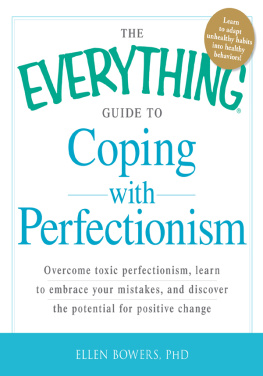
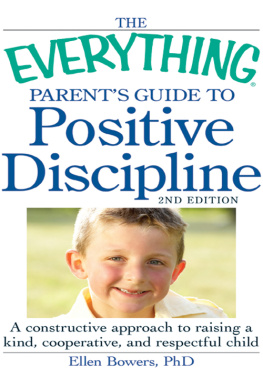

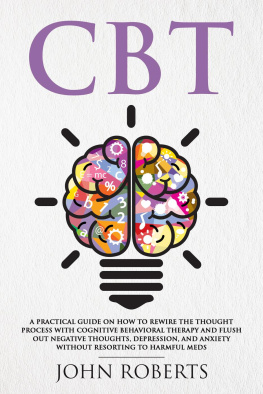
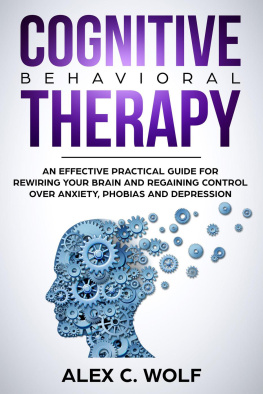

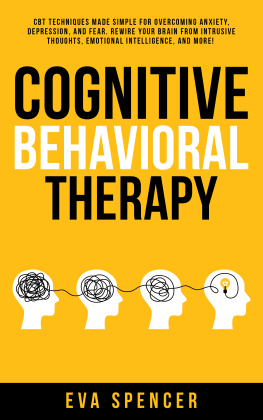
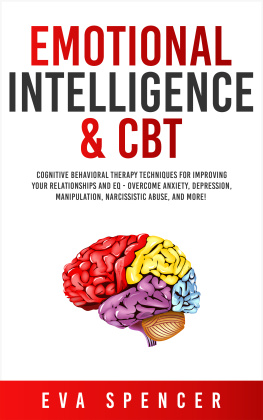
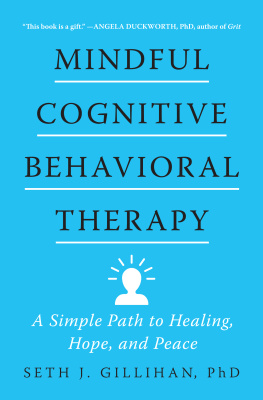
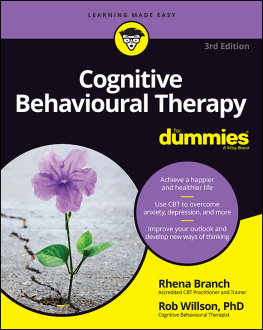
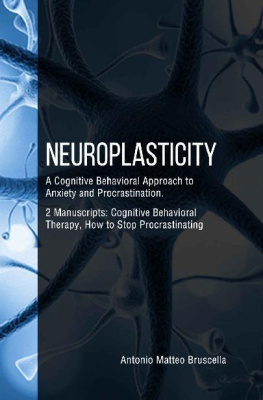
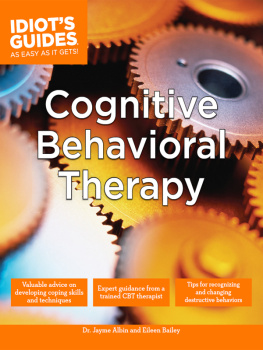





 Series!
Series!


